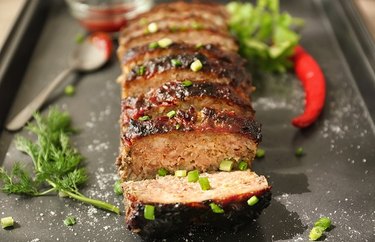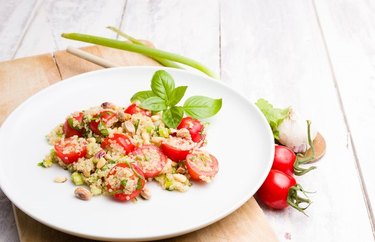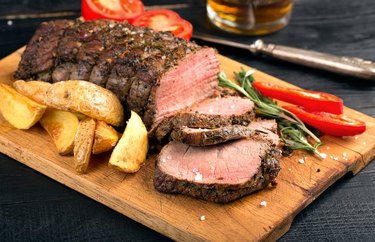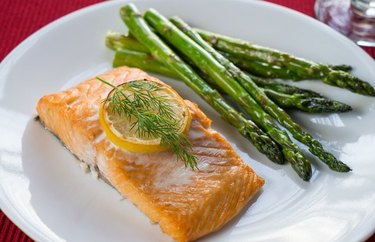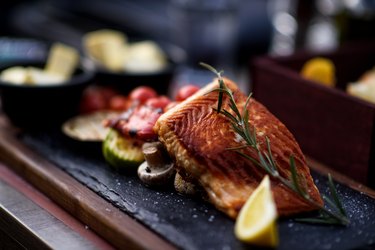
If your day is fueled by caffeine and sugar to keep you awake, you may be one of the millions of Americans who aren't getting enough sleep. After all, adults need seven or more hours of sleep each night, according to the The Centers for Disease Control and Prevention (CDC). Are you getting enough?
Our bodies need sleep for plenty of reasons, such as the following, per the Division of Sleep Medicine at Harvard Medical School:
Video of the Day
Video of the Day
- Memory consolidation
- Mood regulation
- Energy conservation and rejuvenation
- Muscle and tissue repair and growth
- Immune system function
That's why there is a renewed interest in the link between nutrition and your body's daily rhythm, and there's even a name for it — chrononutrition, according to April 2019 research published in Nutrients. Part of this theory is that there are components in food that can help you fall and stay asleep and restore your circadian rhythm.
So to help boost your snooze time, we've rounded up delicious dinner recipes that pack in nutrients linked to better sleep. Get cookin' and get snoozin'.
1. Turkey Meatloaf (Tryptophan)
While there are many reasons you put your feet up and take a nap after Thanksgiving dinner, the turkey you ate is indeed one of them. Turkey is one of the highest sources of tryptophan you can get, according to September 2018 research published in the International Journal of Tryptophan Research.
Tryptophan is an amino acid that helps make serotonin, which is vital for sleep regulation. In addition, adding high-carbohydrate foods to your dinner — such as sweet potatoes, corn or brown rice — can help increase the amount of tryptophan available to be converted to serotonin, according to the research in Nutrients.
You can also add more tryptophan to your diet with chicken, milk, tuna, oats, peanuts, cheddar cheese and bananas.
Get the Turkey Meatloaf recipe and nutrition info here.
Read more: 10 Surprising Ways Sleep Affects Your Whole Body
2. Red Quinoa With Pistachios (Melatonin)
Melatonin has long been regarded as the hormone that helps regulate sleep. It is most often converted from tryptophan, but there are also foods that naturally contain melatonin. Pistachios contain a surprisingly large amount of melatonin compared to other plant and animal foods.
As a comparison, pistachios contain over 200,000 nanograms per gram (ng/g) of melatonin compared to 1.54 ng/g in one egg, according to April 2017 research published in Nutrients. You can find more naturally occurring melatonin in foods such as tomatoes, grapes, chicken, mushrooms, strawberries, rice, lentils and kidney beans.
Get the Red Quinoa With Pistachios recipe and nutrition info here.
Read more: 5 Simple Steps to Get the Best Night of Sleep Ever
3. Zucchini Noodles With Spinach Pesto and Peas (Magnesium)
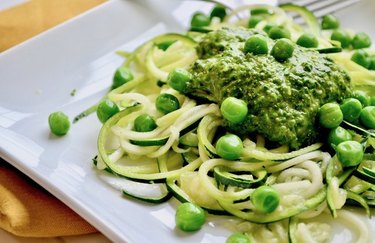
Magnesium has always been an important nutrient, but health enthusiasts are starting to take notice.
Magnesium helps activate the release of gamma-aminobutyric acid, or GABA, a neurotransmitter responsible for slowing you down and getting the body into NREM sleep, aka deep sleep. Magnesium deficiency has also been shown to contribute to sleep disorders, all according to the book, Magnesium in the Central Nervous System.
Magnesium can be found in green leafy vegetables (such as spinach), and also in foods such as peanuts, cashews, avocado, almonds and fortified breakfast cereals. Just a half-cup of cooked spinach will give you 20 percent of your daily value of magnesium, according to the National Institutes of Health (NIH).
Get the Zucchini Noodles With Spinach Pesto and Peas recipe and nutrition info here.
Read more: How Soon Do You Feel the Benefits of Magnesium?
4. Gremolata Beef Roast (Zinc)
Zinc is a mineral that is well known for its role in growth and development, immune function and tissue repair — but it also might be important in regulating sleep. While the effects of zinc aren't completely understood by researchers, there does seem to be a correlation (not causation) between zinc and sleep.
A November 2017 review published in the International Journal of Molecular Sciences found that those who were deficient in zinc had lower sleep duration and quality. Three ounces of this beef roast will give you 47 percent of your daily value of zinc, according to the NIH. Round out the rest with other zinc foods such as yogurt, cashews, cheese, chickpeas and fortified cereals.
Get the Gremolata Beef Roast recipe and nutrition info here.
5. Kiwi, Zucchini and Apple Smoothie (Serotonin)
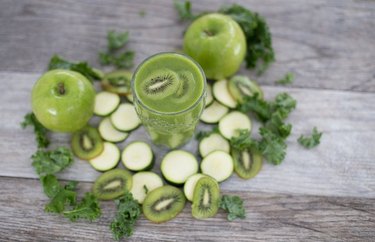
A smoothie for dinner? You'll sleep like a baby. Clinical evidence supports that eating two kiwis one hour before bed appears to enhance the sleep of individuals with self-reported sleep disorders and may also promote sleep in healthy individuals, according to a September 2016 article in the journal Advances in Nutrition.
It is not clear exactly which nutrient in kiwi helped study participants sleep better, but adding a couple of kiwis to your plate isn't going to hurt.
Other food sources of serotonin include pineapple, plums, tomatoes and spinach, according to a May 2018 review study published in Nutrients.
Get the Kiwi, Zucchini and Apple Smoothie recipe and nutrition info here.
6. Chicken, Chickpeas and Chorizo Stew (Vitamin B6)
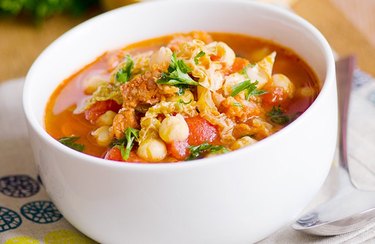
You may have heard that nutrients work together in the body, which is why it's never appropriate to take an individual vitamin/mineral supplement unless instructed to do so.
Case in point: The conversion of tryptophan to serotonin needs vitamin B6. So, not only should you ensure you are eating foods with tryptophan, but you should also have adequate amounts of vitamin B6.
One cup of chickpeas will give you 55 percent of your daily value of vitamin B6, according to the NIH, and this delicious stew packs plenty of the legume. Other foods that can provide B6 include tuna, salmon, potatoes, turkey, bananas and fortified cereals.
Get the Chicken, Chickpeas and Chorizo Stew recipe and nutrition info here.
7. Italian White Beans and Spinach (Iron)
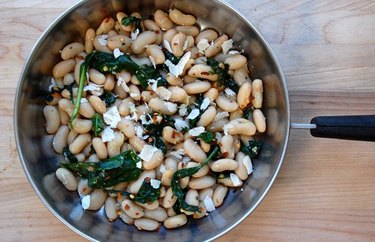
If you have feelings of tingling, crawling, aching or pain in your legs that keep you awake and is only relieved by moving, you may have restless legs syndrome (RLS).
Researchers haven't been able to pinpoint a cause for RLS, but experts at Harvard Medical School indicate that those with RLS are usually iron deficient. Eating foods high in iron may help correct this condition and lead to a better night's sleep.
One cup of these white beans will give you 8 milligrams of iron, which is around 44 percent of the daily value. And this delicious salad packs in both white beans and iron-filled spinach, a double whammy against insomnia. Other foods that contain iron are dark chocolate, oysters, fortified cereals, lentils, beef, tofu and chicken.
Tip
Add a source of vitamin C — such as strawberries, oranges or bell peppers — to help your body absorb more iron from plant-based foods.
Get the Italian White Beans and Spinach recipe and nutrition info here.
8. Baked Salmon (Omega-3 Fatty Acids)
If you've been slacking on getting your two servings of fish per week, then you might be low on your omega-3 fatty acids — and this can affect your sleep.
Omega-3 fatty acids can help reduce inflammation, which is associated with higher levels of sleep disturbances, according to a July 2016 review study published in Biological Psychiatry. In fact, reduction in sleep disturbances and improved sleep quality was also observed in children who frequently ate fish, per a December 2017 research article published in Scientific Reports. So why not start with this scrumptious salmon recipe that's easy to prep?
If you're a vegetarian or vegan — or you just don't like fish — there are plant-based sources of omega-3s. Chia seeds, flax seeds, walnuts, canola oil and edamame all make the cut, but know that animal-based omega-3s are better absorbed in the body.
Get the Baked Salmon recipe and nutrition info here.
Warning
Whole foods should always be your first choice when looking at improving your sleep through nutrients. If you feel that taking a supplement would be a better option for you, make sure you clear it with your healthcare team to ensure you are taking an appropriate dosage and that the nutrients don't interfere with any of your current medications.
- CDC: "How Much Sleep Do I Need?"
- Division of Sleep Medicine at Harvard Medical School: "Why Do We Sleep Anyway?"
- Nutrients: "Dietary Sources and Bioactivities of Melatonin"
- Magnesium in the Central Nervous System: “Magnesium in Neuroses and Neuroticism”
- International Journal of Molecular Sciences: "Dietary Zinc Acts as a Sleep Modulator"
- National Institutes of Health: "Vitamin B6"
- National Institutes of Health: "Magnesium"
- National Institutes of Health: "Zinc"
- Nutrients: "Dietary Neurotransmitters: A Narrative Review on Current Knowledge"
- Harvard Health Publishing: "Are You Missing This Simple Treatment for Restless Legs?"
- Biological Psychiatry: "Sleep Disturbance, Sleep Duration, and Inflammation: A Systematic Review and Meta-Analysis of Cohort Studies and Experimental Sleep Deprivation"
- Scientific Reports: "The Mediating Role of Sleep in the Fish Consumption — Cognitive Functioning Relationship: A Cohort Study"
- Nutrients: "Sleep and Nutrition Interactions: Implications for Athletes"
- International Journal of Tryptophan Research: "Analysis, Nutrition, and Health Benefits of Tryptophan"
- Advances in Nutrition: “Effects of Diet on Sleep Quality”
